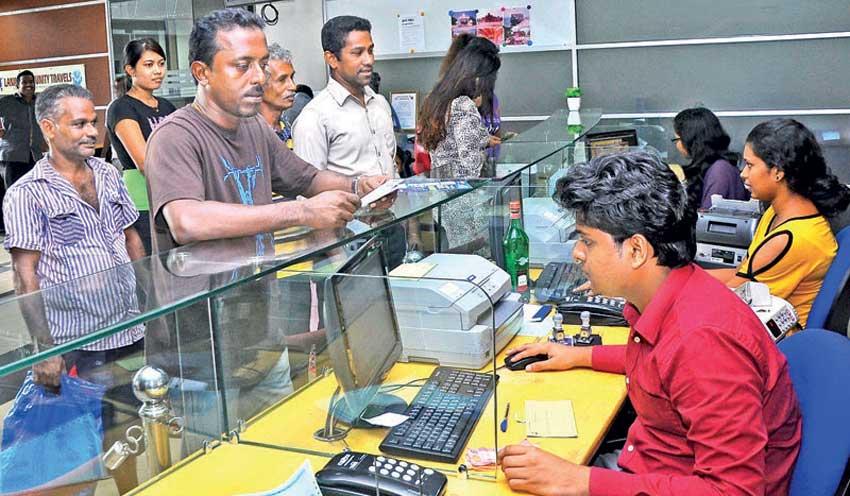21 Apr 2020 - {{hitsCtrl.values.hits}}

Sri Lanka’s State sector employs over 1 million individuals. There are many estimates regarding the overstaffing of this sector
 The purpose of this article is to suggest how Sri Lanka can benefit from the obvious need for social support in the context of ‘COVID-19’.
The purpose of this article is to suggest how Sri Lanka can benefit from the obvious need for social support in the context of ‘COVID-19’.
Relief payments are necessary, but they should be tied to retraining so that those who are unemployed or underemployed can find productive work. Since the world will clearly require better service, training for hospitality and for healthcare these areas could be priorities.
Both these require better soft skills, in particular in English. Surely government can start online English courses, and link welfare payments to the successful participation in these courses?
Examples of govt. support for industrial development in Sri Lanka
A lesser known fact of how IT industry and IT attitude got a quantum jump in India was that a local politician Chandrababu Naidu in Andhra Pradesh anticipated the Y2K issue and trained thousands of youth to be able to debug software from the feared Y2K syndrome. Thousands of these trained programmers, though at the lower end of the spectrum, were employed in the USA to reprogramme software for a simple task of changing the date stamp in the programmes.
Better educated among them were able to find further employment in the US but most returned with large savings and larger aspirations. IT became the buzzword in India and Hyderabad and Bangalore became global
IT hubs.
Garment exports constituted 44.7 percent of our total exports in 2018, and is a significant contributor to our economy in terms of contribution to GDP and also total employment.
This industry was devised and nurtured by the Premadasa government of the late 80’s to early 90’s. The promotion of this industry defied all ‘laws of comparative advantage’ and was frowned on by many economists at the time.
The industry, that over the years of war was a saving grace for the Sri Lankan economy, was created by political will. It was nurtured and assisted into maturity.
Areas of economy that need transformation
The Sri Lankan State sector employs over 1 million individuals. The government sector employees constitute around 5 percent of the total population of Sri Lanka and around 14 percent of the total workforce. There are many estimates to the overstaffing of this sector.
One estimate was that the workforce requirement was only around 700,000 compared to the 1 million individuals employed.
Whilst the numbers are not clear, the existence of overstaffing is widely accepted. The extent of overstaffing could be assumed to be ‘significant’.
Sri Lanka has over 1 million self-employed individuals as trishaw drivers. Trishaws have helped to pick up the gap in public transport to deliver last-mile connectivity. The sector has grown beyond this and is even competing with public transport of intercity travel.
The trishaw is seen as the mode of transport for the common man because it is cost-effective. But, in today’s context, the cost difference between a trishaw and a conventional small car in terms of CIF before duty is not very significant. The cost difference at the point of purchase comes from the difference in duty. The air pollution, noise pollution and safety of the trishaw do not meet modern standards. Moreover, the saturation and the sheer number of youth employed in this area is an under employment of our youth.
The ‘Gulati’ principal
I was fortunate to sit next to Mohinder Gulati, a World Bank consultant on energy and development, on a flight back from New Delhi.
Whilst explaining the successful pilots in the restructuring of the energy subsidy for the Indian agriculture sector, he explained that a subsidy reform should be smartly designed to not only address the ‘pain points’ of the beneficiary but to also get something in return for the payment made. It is important to protect the dignity of the beneficiaries by giving it not as a charity but as payment for a transaction.
Application of ‘gulati principal’ in the context of COVID-19 in Sri Lanka
The Sri Lankan government will need to make a relief payment to the lower income segments and the daily wage earners.
In doing so, the government could structure this payment not as a mere allowance, but as a payment made
towards retraining.
If the government was to make retraining programmes available via the digital media, both on the internet and on TV, and had a system of ensuring that citizens underwent this training, and based on certification was made a payment, the poor would be getting cash into their hands to meet their requirements of essential food, but the government would in return be achieving the need to retrain the workforce.
The trishaw drivers, unemployed youth, and government employees could be retrained maybe as primary health workers. The government officials could be retrained to function in a work from home scenario.
The concept of linking transfer payments to address a social pain point and also to achieve a long-term economic benefit of re-skilling the workforce for much needed primary healthcare services could be a very effective tool, at this point in time. The Government would be solving an immediate social crisis and a longer-term issue concurrently.
Conclusion
The purpose of this article is to make the point that in the chaos of corona, there could be opportunities that could be taken advantage of.
May I use the analogy of the safety car in a motor race. The safety car comes out, preventing drivers from overtaking, when there has been an accident. This allows officials to clear the accident and ensure the track is safe to continue racing. In this scenario, when overtaking is banned, the leader and all competitors lose their lead.
The pack bunches up together. It completely changes the relative positions of the competitors. Similarly, corona has impacted the world.
The extent to which it impacts one nation could depend on how that nation envisages the future and positions itself. Hence, a Nation could end up in a relatively better position in a post corona world. This same analogy is true for a business.
(Sheran Fernando is a Co-Founder of Innosolve Lanka (Pvt.) Ltd., a start-up dedicated to introducing sustainable mobility solutions in Sri Lanka. He is an economist by training, with wide commercial experience including 20 years in the automotive industry. He belongs to the alumni of Harvard
Business School)
25 Dec 2024 9 hours ago
25 Dec 2024 9 hours ago
25 Dec 2024 9 hours ago